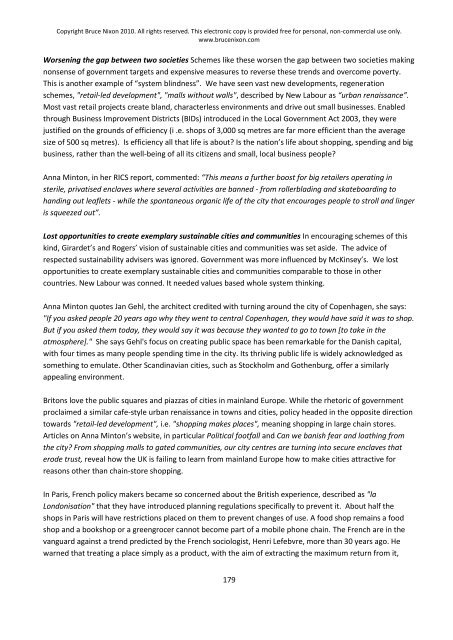A better world is possible - Global Commons Institute
A better world is possible - Global Commons Institute
A better world is possible - Global Commons Institute
Create successful ePaper yourself
Turn your PDF publications into a flip-book with our unique Google optimized e-Paper software.
Copyright Bruce Nixon 2010. All rights reserved. Th<strong>is</strong> electronic copy <strong>is</strong> provided free for personal, non-commercial use only.<br />
www.brucenixon.com<br />
Worsening the gap between two societies Schemes like these worsen the gap between two societies making<br />
nonsense of government targets and expensive measures to reverse these trends and overcome poverty.<br />
Th<strong>is</strong> <strong>is</strong> another example of “system blindness”. We have seen vast new developments, regeneration<br />
schemes, "retail-led development", "malls without walls", described by New Labour as “urban rena<strong>is</strong>sance”.<br />
Most vast retail projects create bland, characterless environments and drive out small businesses. Enabled<br />
through Business Improvement D<strong>is</strong>tricts (BIDs) introduced in the Local Government Act 2003, they were<br />
justified on the grounds of efficiency (i .e. shops of 3,000 sq metres are far more efficient than the average<br />
size of 500 sq metres). Is efficiency all that life <strong>is</strong> about? Is the nation’s life about shopping, spending and big<br />
business, rather than the well-being of all its citizens and small, local business people?<br />
Anna Minton, in her RICS report, commented: “Th<strong>is</strong> means a further boost for big retailers operating in<br />
sterile, privat<strong>is</strong>ed enclaves where several activities are banned - from rollerblading and skateboarding to<br />
handing out leaflets - while the spontaneous organic life of the city that encourages people to stroll and linger<br />
<strong>is</strong> squeezed out”.<br />
Lost opportunities to create exemplary sustainable cities and communities In encouraging schemes of th<strong>is</strong><br />
kind, Girardet’s and Rogers’ v<strong>is</strong>ion of sustainable cities and communities was set aside. The advice of<br />
respected sustainability adv<strong>is</strong>ers was ignored. Government was more influenced by McKinsey’s. We lost<br />
opportunities to create exemplary sustainable cities and communities comparable to those in other<br />
countries. New Labour was conned. It needed values based whole system thinking.<br />
Anna Minton quotes Jan Gehl, the architect credited with turning around the city of Copenhagen, she says:<br />
"If you asked people 20 years ago why they went to central Copenhagen, they would have said it was to shop.<br />
But if you asked them today, they would say it was because they wanted to go to town [to take in the<br />
atmosphere]." She says Gehl's focus on creating public space has been remarkable for the Dan<strong>is</strong>h capital,<br />
with four times as many people spending time in the city. Its thriving public life <strong>is</strong> widely acknowledged as<br />
something to emulate. Other Scandinavian cities, such as Stockholm and Gothenburg, offer a similarly<br />
appealing environment.<br />
Britons love the public squares and piazzas of cities in mainland Europe. While the rhetoric of government<br />
proclaimed a similar cafe-style urban rena<strong>is</strong>sance in towns and cities, policy headed in the opposite direction<br />
towards "retail-led development", i.e. "shopping makes places", meaning shopping in large chain stores.<br />
Articles on Anna Minton’s website, in particular Political footfall and Can we ban<strong>is</strong>h fear and loathing from<br />
the city? From shopping malls to gated communities, our city centres are turning into secure enclaves that<br />
erode trust, reveal how the UK <strong>is</strong> failing to learn from mainland Europe how to make cities attractive for<br />
reasons other than chain-store shopping.<br />
In Par<strong>is</strong>, French policy makers became so concerned about the Brit<strong>is</strong>h experience, described as "la<br />
London<strong>is</strong>ation" that they have introduced planning regulations specifically to prevent it. About half the<br />
shops in Par<strong>is</strong> will have restrictions placed on them to prevent changes of use. A food shop remains a food<br />
shop and a bookshop or a greengrocer cannot become part of a mobile phone chain. The French are in the<br />
vanguard against a trend predicted by the French sociolog<strong>is</strong>t, Henri Lefebvre, more than 30 years ago. He<br />
warned that treating a place simply as a product, with the aim of extracting the maximum return from it,<br />
179
















